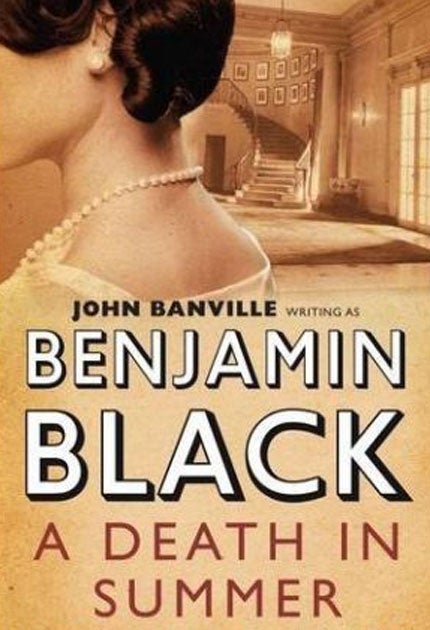A Death in Summer, By Benjamin Black
A mystery that's worth investigating

Your support helps us to tell the story
From reproductive rights to climate change to Big Tech, The Independent is on the ground when the story is developing. Whether it's investigating the financials of Elon Musk's pro-Trump PAC or producing our latest documentary, 'The A Word', which shines a light on the American women fighting for reproductive rights, we know how important it is to parse out the facts from the messaging.
At such a critical moment in US history, we need reporters on the ground. Your donation allows us to keep sending journalists to speak to both sides of the story.
The Independent is trusted by Americans across the entire political spectrum. And unlike many other quality news outlets, we choose not to lock Americans out of our reporting and analysis with paywalls. We believe quality journalism should be available to everyone, paid for by those who can afford it.
Your support makes all the difference.When John Banville compared himself to a sheep venturing among wolves, there were those who felt he was being a touch disingenuous. Banville was referring to a controversial appearance at the Harrogate crime writing festival wearing his "Benjamin Black" hat, as the writer of a Dublin-set historical crime-fiction series rather than as heavyweight literary novelist. In front of an audience of crime writers and aficionados, he was widely perceived to have suggested that he did not grant his crime novels the same level of seriousness as his literary work; the former were mere jeux d'esprit to be dispatched quickly, while his real achievement required far more attention.
Banville seemed surprised at the noses he had put out of joint. But the crime-writing fraternity is famously prickly about its lack of respectability. However, Banville overlooked another factor in the brouhaha – the way his Benjamin Black novels are received among many crime-fiction practitioners.
Just a few pages of the latest outing (featuring his pathologist protagonist, Quirke) demonstrate just what a stylist he is; a writer whose use of English can create an almost sensuous frisson. The bloody shotgun murder of a newspaper magnate has Quirke on the trail of a killer; the Dublin here has a richness reminiscent of the city's greatest chronicler, Joyce, while the 1950s are evoked with pinpoint precision.
But then we come to the sticking point, and the reason why crime writers were grumbling in the wine bars of Harrogate after the perceived slight: Black's plotting. As ever, everything is supremely functional but seems utilitarian rather than inspired. The mechanics of the investigation will be familiar to the avid consumer of the genre: the apparent suicide quickly nailed by the sleuth as murder; the array of suspects who might want an unpopular man dead; the divided family; the misdirection. All are present and correct, but the least interesting things about the novel.
Raymond Chandler, too, spent little time on his plots; his genius was to reinvent the tropes of detective fiction so consummately that readers barely noticed the rickety narrative structure. But despite his descriptive skills, Black's use of such legerdemain is less sure. In the final analysis, however, and putting such reservations aside, A Death in Summer is still a highly professional and engaging piece of work.
Join our commenting forum
Join thought-provoking conversations, follow other Independent readers and see their replies
Comments